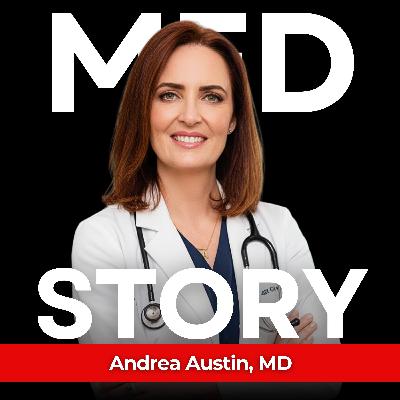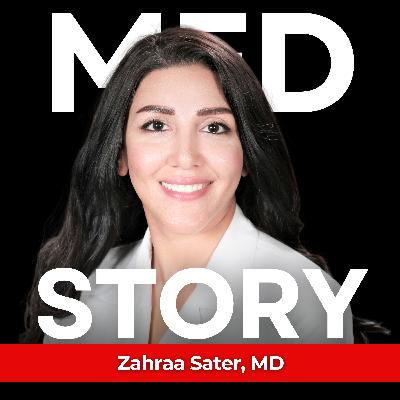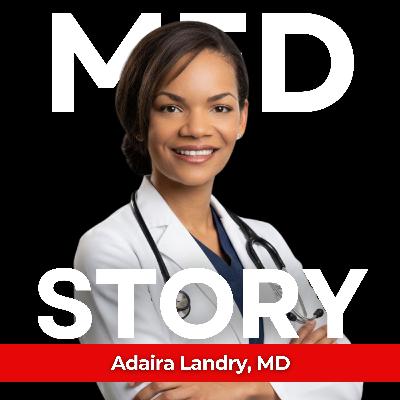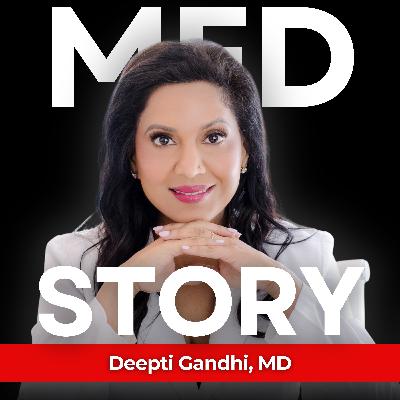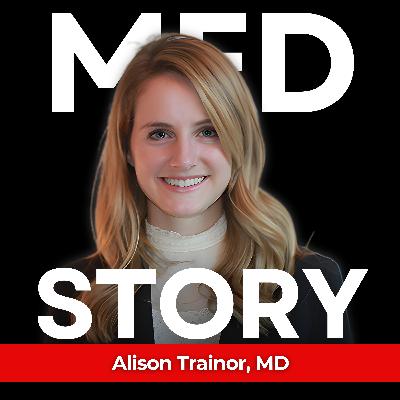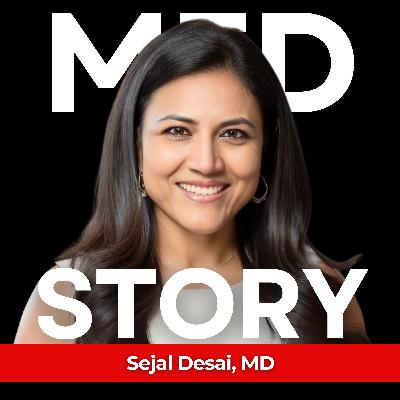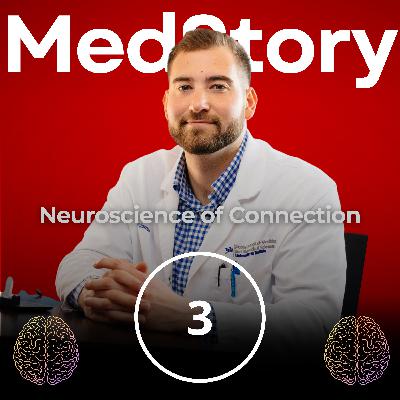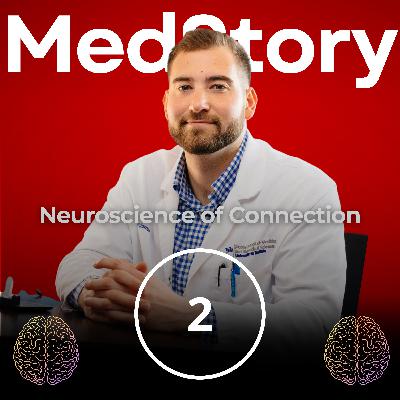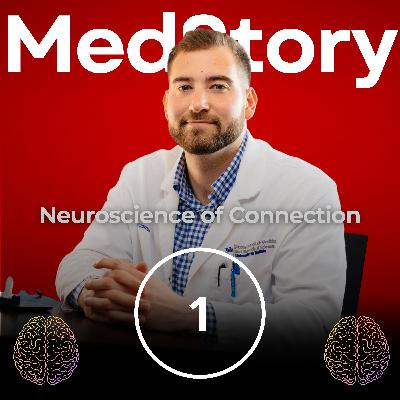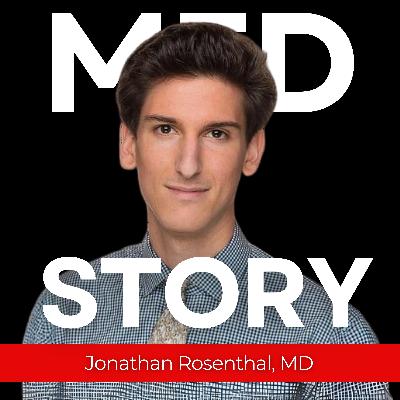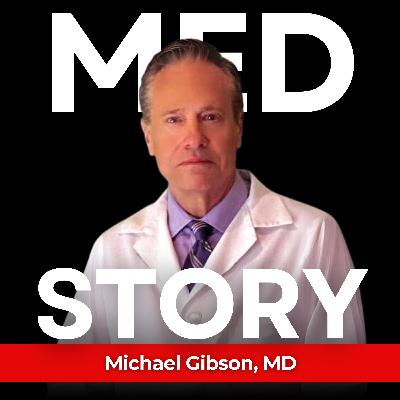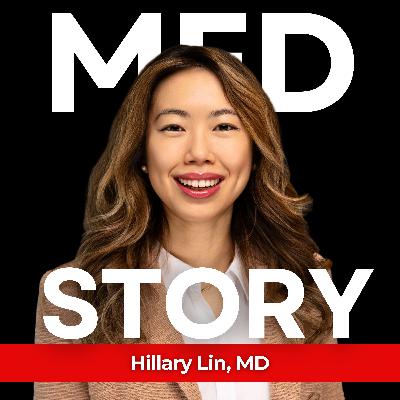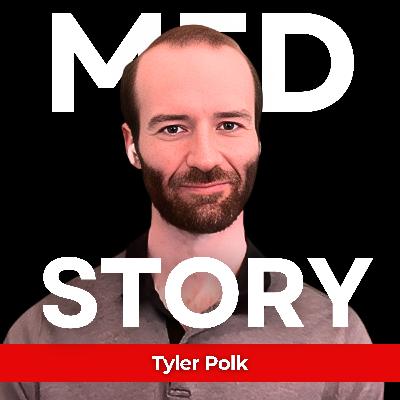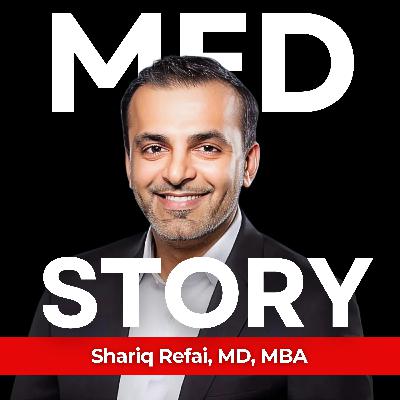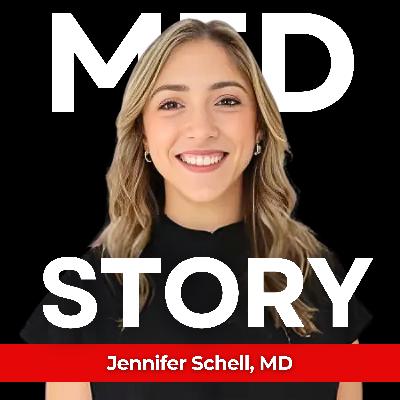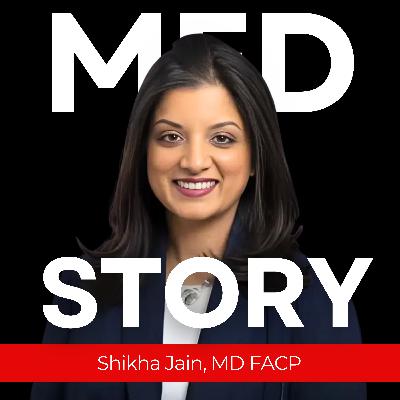Discover MedStory Podcast
MedStory Podcast

MedStory Podcast
Author: MedStory Studio
Subscribed: 0Played: 2Subscribe
Share
© MedStory Studio
Description
Where medicine meets innovation, storytelling, and the human experience.
Hosted by Spencer Lalk, The MedStory Podcast brings you raw, unfiltered conversations with the most forward-thinking physicians, healthcare leaders, and entrepreneurs. We dive into the real stories behind their journeys—how they’re reshaping medicine, building businesses, and challenging the status quo. Whether you're a doctor, healthtech founder, or just passionate about the future of healthcare, this podcast will inspire, educate, and move you.
Follow for new episodes that go beyond medicine—and into the future of
Hosted by Spencer Lalk, The MedStory Podcast brings you raw, unfiltered conversations with the most forward-thinking physicians, healthcare leaders, and entrepreneurs. We dive into the real stories behind their journeys—how they’re reshaping medicine, building businesses, and challenging the status quo. Whether you're a doctor, healthtech founder, or just passionate about the future of healthcare, this podcast will inspire, educate, and move you.
Follow for new episodes that go beyond medicine—and into the future of
52 Episodes
Reverse
In this powerful episode, Dr. Andrea Austin shares how her deployment to Iraq shaped the way she practices medicine today. From activating walking blood banks on the battlefield to watching every injured patient survive an explosion, she learned how preparation, teamwork, and emotional clarity can save lives. But what she did not expect was how quietly those experiences would follow her home. Years later, standing in front of a grieving mother whose son had just died, she felt nothing. That moment forced her to confront a truth she had been avoiding for years. She was burned out, shut down, and losing the part of herself that made her a healer.What happened next became the defining mission of her career. Dr. Austin dove into therapy, reflection, and the science of emotional resilience. She rebuilt her identity as a physician and created a framework to teach others how to protect their own humanity in a broken system. Today she is launching a new emergency medicine residency designed to train doctors without destroying them. This episode is about war, loss, identity, and the courage it takes to redesign a culture that has pushed too many physicians past their breaking point. It is a story every future doctor needs to hear.🎙️ Want to be a guest on the podcast? Click👉 https://medstorymedia.com/podcast📚 Access free tools and downloads. Click 👉 https://medstorymedia.com/resourcesDisclaimer: The views expressed in this podcast are solely those of the individuals speaking and do not represent the views of their employers. This episode is for informational and storytelling purposes only and should not be taken as medical advice. Always consult your healthcare provider with any personal medical concerns.Music Credits: Music for this episode comes from Blue Dot Sessions and the Descript Audio Library.Production Note: The MedStory Podcast is made possible by MedStory Studios and listeners like you.
Most people think obesity treatment is all about willpower, calories, and medication. Dr. Zahraa Sater knows that’s only half the story. After training at top institutions and watching patient after patient get labeled as “noncompliant,” she realized the system was missing something essential. Her patients didn’t fail because they lacked discipline. They failed because no one was addressing the subconscious patterns driving their behavior.In this episode, Dr. Sater breaks down how she uses hypnotherapy, subconscious rewiring, and traditional endocrinology to treat obesity in a completely different way. She explains the hidden mind blocks that keep people stuck, why some patients subconsciously feel safer in a larger body, and why GLP-1s alone are not enough for long-term success. This conversation challenges everything we assume about weight loss and shows what’s possible when medicine finally treats the whole human, not just the numbers.🎙️ Want to be a guest on the podcast? Click👉 https://medstorymedia.com/podcast📚 Access free tools and downloads. Click 👉 https://medstorymedia.com/resourcesDisclaimer: The views expressed in this podcast are solely those of the individuals speaking and do not represent the views of their employers. This episode is for informational and storytelling purposes only and should not be taken as medical advice. Always consult your healthcare provider with any personal medical concerns.Music Credits: Music for this episode comes from Blue Dot Sessions and the Descript Audio Library.Production Note: The MedStory Podcast is made possible by MedStory Studios and listeners like you.
When Dr. Adaira Landry agreed to speak on a work-life balance panel at 6 p.m., she thought she was doing what ambitious physicians are supposed to do. Instead, she found herself dragging a dresser across her bedroom floor, barricading the door while her young children cried for her on the other side. That moment cracked something open. After a lifetime of chasing achievement, from entering high school at 12 to rising through UC Berkeley, UCLA medical school, NYU, Bellevue, and Harvard, she suddenly realized she was no longer truly present for her kids, her patients, or herself. She was simply surviving, saying yes to everything, and silently burning out.In this episode, Dr. Landry shares how she went from overwhelmed to grounded by learning to set boundaries that protect her time, her mental health, and her identity. She explains how the idea of micro skills, meaning small intentional actions, helped her step back from burnout and build a more sustainable way to practice medicine. If you have ever felt guilty protecting your evenings, pressured to say yes to every request, or exhausted by the demands of medicine, this conversation will show you a new way forward.🎙️ Want to be a guest on the podcast? Click👉 https://medstorymedia.com/podcast📚 Access free tools and downloads. Click 👉 https://medstorymedia.com/resourcesDisclaimer: The views expressed in this podcast are solely those of the individuals speaking and do not represent the views of their employers. This episode is for informational and storytelling purposes only and should not be taken as medical advice. Always consult your healthcare provider with any personal medical concerns.Music Credits: Music for this episode comes from Blue Dot Sessions and the Descript Audio Library.Production Note: The MedStory Podcast is made possible by MedStory Studios and listeners like you.
Sitting on the bathroom floor after a long clinic day, Dr. Gandhi thought she was holding it all together: thriving physician, two young kids, a mortgage, the dream job on paper. But when her four year old stepped out of the tub, wrapped in a towel and quietly said, “I want you to be happy, Mommy,” everything cracked. In that one sentence, she realized her stress was no longer invisible and that the “high functioning” version of herself was actually exhausted, misaligned, and quietly burning out. That moment sent her on an inward journey that began not with a big career move, but with something deceptively simple: a nightly gratitude journal that ended up changing the entire trajectory of her life.In this episode, Dr. Gandhi shares how gratitude, self awareness, and honest reflection led her to leave a prestigious job, build a practice that actually fits her life, and become a coach for other physicians who feel trapped by the system. She breaks down her simple framework for any doctor who feels stuck in their career: change, accept, or leave. You will hear how she pivoted into midlife women’s health and menopause care, how the pandemic became a turning point instead of a breaking point, and why she believes the future of medicine depends on restoring the relationship between doctor and patient while protecting the humanity of clinicians. If you have ever looked at your “perfect” life and quietly wondered, “Why am I not happy,” this conversation is your mirror and your permission slip.🎙️ Want to be a guest on the podcast? Click👉 https://medstorymedia.com/podcast📚 Access free tools and downloads. Click 👉 https://medstorymedia.com/resourcesDisclaimer: The views expressed in this podcast are solely those of the individuals speaking and do not represent the views of their employers. This episode is for informational and storytelling purposes only and should not be taken as medical advice. Always consult your healthcare provider with any personal medical concerns.Music Credits: Music for this episode comes from Blue Dot Sessions and the Descript Audio Library.Production Note: The MedStory Podcast is made possible by MedStory Studios and listeners like you.
At 35, healthy and pregnant with her second child, Dr. Alison Trainor was living the life she had worked so hard to build, a career she loved, a growing family, and a future that felt secure. But a sudden scan on Valentine’s Day revealed more than 20 tumors in her liver, leading to a diagnosis so rare only 90 cases appear in the US each year. Overnight, Alison went from ICU physician to patient, forced to confront the terrifying possibility of leaving her toddler and newborn behind.In this emotional and deeply human episode, Alison opens up about the darkest week of her life, the impossible decisions she faced while pregnant, and the quiet courage it took to keep moving forward. She shares the grief, the fear, the guilt, and the unexpected moments of joy that helped her hold onto hope. This is a story of resilience, motherhood, and choosing life even when the future feels unbearably uncertain.🎙️ Want to be a guest on the podcast? Click👉 https://medstorymedia.com/podcast📚 Access free tools and downloads. Click 👉 https://medstorymedia.com/resourcesDisclaimer: The views expressed in this podcast are solely those of the individuals speaking and do not represent the views of their employers. This episode is for informational and storytelling purposes only and should not be taken as medical advice. Always consult your healthcare provider with any personal medical concerns.Music Credits: Music for this episode comes from Blue Dot Sessions and the Descript Audio Library.Production Note: The MedStory Podcast is made possible by MedStory Studios and listeners like you.
After years of working inside a system that demanded more patients and less presence, Dr. Sejal Desai decided she wasn’t going to let the system define her, or her care.In this episode, she shares how she walked away from burnout and built something new: a direct specialty care clinic that prioritizes time, connection, and balance. From her journey as an immigrant and young mother to launching her own practice and leading a community of women physicians, Dr. Desai’s story is a powerful reminder that medicine can be redefined by those brave enough to start over.🎙️ Want to be a guest on the podcast? Click👉 https://medstorymedia.com/podcast📚 Access free tools and downloads. Click 👉 https://medstorymedia.com/resourcesDisclaimer: The views expressed in this podcast are solely those of the individuals speaking and do not represent the views of their employers. This episode is for informational and storytelling purposes only and should not be taken as medical advice. Always consult your healthcare provider with any personal medical concerns.Music Credits: Music for this episode comes from Blue Dot Sessions and the Descript Audio Library.Production Note: The MedStory Podcast is made possible by MedStory Studios and listeners like you.
When Dr. Jessica Bunin woke up after open-heart surgery to find her attending quietly sitting by her bedside, everything she believed about medicine changed. It was no longer just about procedures or protocols. It was about presence.In this powerful episode, Dr. Bunin shares her journey through three cancer diagnoses, two war-zone deployments, and a lifetime of service in military medicine. From leading critical care units in Afghanistan to mentoring young physicians, she reflects on how pain, purpose, and human connection can transform the way we lead and care.Her story is a reminder that even in the toughest battles, whether in war, in illness, or in leadership, empathy is the strongest force we have.🎙️ Want to be a guest on the podcast? Click 👉 https://medstorymedia.com/podcast📚 Access free tools and downloads. Click 👉 https://medstorymedia.com/resourcesDisclaimer: The views expressed in this podcast are solely those of the individuals speaking and do not represent the views of their employers. This episode is for informational and storytelling purposes only and should not be taken as medical advice. Always consult your healthcare provider with any personal medical concerns.Music Credits: Music for this episode comes from Blue Dot Sessions and the Descript Audio Library.Production Note: The MedStory Podcast is made possible by MedStory Studios and listeners like you.
We know that connection is essential for our health, but why does it feel so hard sometimes? In this final episode of the series, we move from theory to action, tackling the internal barriers and cognitive errors that sabotage our social lives.Neuroscientist Dr. Ben Rein provides the ultimate masterclass on likability and longevity, explaining why our brains are hardwired to make us underestimate how much people enjoy our company—a phenomenon known as The Liking Gap. He also offers a practical framework for prioritizing connection, even during the most stressful times (like launching a book and having a baby in the same month!).What You'll Learn in This Episode:● The Social Math Mistake: Why most people wrongly rate themselves as worse-than-average at socializing, leading to health anxiety and isolation.Inter-Brain Synchrony: The incredible phenomenon of your brain "syncing up" with romantic partners or collaborators, often described as being "on the same wavelength".● The Masterclass on Likability: Three easy adjustments to make yourself more appealing, including the power of social touch (which can lead to higher tips!), maintaining eye contact, and avoiding Phubbing (ignoring a person to look at your phone).● Leveling Up Digital Interaction: How adding emojis to a text message can activate similar brain responses to a human facial expression, enhancing richness and preventing miscommunication.● Longevity's Missing Link: The standardized psychological tool (Revised Index of Social Engagement - RISE) that Dr. Rein recommends for measuring social connectedness as a fundamental health biomarker.This series wraps up with the powerful reminder that friendships aren't just "nice to have"—they're a fundamental part of being human and a vital investment in your long-term health.📘 Dr. Ben Rein’s new book, Why Brains Need Friends: The Neuroscience of Social Connection, is available now: https://amzn.to/46ZLFv6🎙️ Want to be a guest on the podcast? Click 👉 https://medstorymedia.com/podcast📚 Access free tools and downloads. Click 👉 https://medstorymedia.com/resourcesDisclaimer: The views expressed in this podcast are solely those of the individuals speaking and do not represent the views of their employers. This episode is for informational and storytelling purposes only and should not be taken as medical advice. Always consult your healthcare provider with any personal medical concerns.Music Credits: Music for this episode comes from Blue Dot Sessions and the Descript Audio Library.Production Note: The MedStory Podcast is made possible by MedStory Studios and listeners like you.
We know that connection is essential for our health, but why does it feel so hard sometimes? In this final episode of the series, we move from theory to action, tackling the internal barriers and cognitive errors that sabotage our social lives.Neuroscientist Dr. Ben Rein provides the ultimate masterclass on likability and longevity, explaining why our brains are hardwired to make us underestimate how much people enjoy our company—a phenomenon known as The Liking Gap. He also offers a practical framework for prioritizing connection, even during the most stressful times (like launching a book and having a baby in the same month!).What You'll Learn in This Episode:● The Social Math Mistake: Why most people wrongly rate themselves as worse-than-average at socializing, leading to health anxiety and isolation.Inter-Brain Synchrony: The incredible phenomenon of your brain "syncing up" with romantic partners or collaborators, often described as being "on the same wavelength".● The Masterclass on Likability: Three easy adjustments to make yourself more appealing, including the power of social touch (which can lead to higher tips!), maintaining eye contact, and avoiding Phubbing (ignoring a person to look at your phone).● Leveling Up Digital Interaction: How adding emojis to a text message can activate similar brain responses to a human facial expression, enhancing richness and preventing miscommunication.● Longevity's Missing Link: The standardized psychological tool (Revised Index of Social Engagement - RISE) that Dr. Rein recommends for measuring social connectedness as a fundamental health biomarker.This series wraps up with the powerful reminder that friendships aren't just "nice to have"—they're a fundamental part of being human and a vital investment in your long-term health.📘 Dr. Ben Rein’s new book, Why Brains Need Friends: The Neuroscience of Social Connection, is available now: https://amzn.to/46ZLFv6🎙️ Want to be a guest on the podcast? Click👉 https://medstorymedia.com/podcast📚 Access free tools and downloads. Click 👉 https://medstorymedia.com/resourcesDisclaimer: The views expressed in this podcast are solely those of the individuals speaking and do not represent the views of their employers. This episode is for informational and storytelling purposes only and should not be taken as medical advice. Always consult your healthcare provider with any personal medical concerns.Music Credits: Music for this episode comes from Blue Dot Sessions and the Descript Audio Library.Production Note: The MedStory Podcast is made possible by MedStory Studios and listeners like you.
We know that connection is essential for our health, but why does it feel so hard sometimes? In this final episode of the series, we move from theory to action, tackling the internal barriers and cognitive errors that sabotage our social lives.Neuroscientist Dr. Ben Rein provides the ultimate masterclass on likability and longevity, explaining why our brains are hardwired to make us underestimate how much people enjoy our company—a phenomenon known as The Liking Gap. He also offers a practical framework for prioritizing connection, even during the most stressful times (like launching a book and having a baby in the same month!).What You'll Learn in This Episode:● The Social Math Mistake: Why most people wrongly rate themselves as worse-than-average at socializing, leading to health anxiety and isolation.Inter-Brain Synchrony: The incredible phenomenon of your brain "syncing up" with romantic partners or collaborators, often described as being "on the same wavelength".● The Masterclass on Likability: Three easy adjustments to make yourself more appealing, including the power of social touch (which can lead to higher tips!), maintaining eye contact, and avoiding Phubbing (ignoring a person to look at your phone).● Leveling Up Digital Interaction: How adding emojis to a text message can activate similar brain responses to a human facial expression, enhancing richness and preventing miscommunication.● Longevity's Missing Link: The standardized psychological tool (Revised Index of Social Engagement - RISE) that Dr. Rein recommends for measuring social connectedness as a fundamental health biomarker.This series wraps up with the powerful reminder that friendships aren't just "nice to have"—they're a fundamental part of being human and a vital investment in your long-term health.📘 Dr. Ben Rein’s new book, Why Brains Need Friends: The Neuroscience of Social Connection, is available now: https://amzn.to/46ZLFv6🎙️ Want to be a guest on the podcast? Click👉 https://medstorymedia.com/podcast📚 Access free tools and downloads. Click 👉 https://medstorymedia.com/resourcesDisclaimer: The views expressed in this podcast are solely those of the individuals speaking and do not represent the views of their employers. This episode is for informational and storytelling purposes only and should not be taken as medical advice. Always consult your healthcare provider with any personal medical concerns.Music Credits: Music for this episode comes from Blue Dot Sessions and the Descript Audio Library.Production Note: The MedStory Podcast is made possible by MedStory Studios and listeners like you.
Last time, we uncovered the hard truth: loneliness is a warning siren from our brain. Now, we flip the story to explore the extraordinary science of connection. It turns out that friendships aren't just comforting, they are lifesaving.Stanford neuroscientist Dr. Ben Rein returns to take us inside the brain's reaction to social bonds, revealing the specific, measurable ways interaction protects us from disease and decline. He introduces the concept of a "Social Diet" and explains why optimizing it is the key to maximizing your health benefits.In this episode, you will learn about:● Why in-person interaction is almost always better for your mood than virtual chats, and how different types of communication fall on a "benefit gradient".● The concept of social homeostasis and how to find your optimal "set point" for interaction to avoid fatigue.● The incredible health benefits of oxytocin—often called "nature's medicine"—which is anti-inflammatory, neuroprotective, and aids in wound healing and stress.● Why looking into a dog’s eyes triggers an oxytocin surge for both you and the dog, and how this relates to our deep evolutionary history.● Why Dr. Rein is horrified by the idea of using AI/chatbots as a loneliness solution, and how the brain processes robot touch differently from human touch.This episode proves that prioritizing connection is one of the most powerful things you can do for your long-term physical and mental health.📘 Dr. Ben Rein’s new book, Why Brains Need Friends: The Neuroscience of Social Connection, is available now: https://amzn.to/46ZLFv6🎙️ Want to be a guest on the podcast? Click👉 https://medstorymedia.com/podcast📚 Access free tools and downloads. Click 👉 https://medstorymedia.com/resourcesDisclaimer: The views expressed in this podcast are solely those of the individuals speaking and do not represent the views of their employers. This episode is for informational and storytelling purposes only and should not be taken as medical advice. Always consult your healthcare provider with any personal medical concerns.Music Credits: Music for this episode comes from Blue Dot Sessions and the Descript Audio Library.Production Note: The MedStory Podcast is made possible by MedStory Studios and listeners like you.
In this powerful first episode of a three-part series, we tackle an epidemic often ignored: loneliness. Despite being more "connected" than ever, data shows we are, in fact, getting lonelier.Dr. Ben Rein, a Stanford-trained neuroscientist, joins us to unpack the science behind this modern crisis, sharing the personal, transformative nightmare that led him to study the neuroscience of social behavior. Loneliness is more than just an emotion; it's an urgent biological signal from your brain, as real as hunger or thirst.Listen to understand:● The critical difference between isolation (the objective state of being alone) and loneliness (the subjective feeling, which you can experience even in a crowd).● Why being isolated increases your risk of death by any cause by anywhere between 32% to 50%.● How chronic isolation triggers a stress response, driving inflammation that sets your body up for failure against challenges like heart attacks and strokes.● The surprising evidence that interaction is like a "full body workout" for the brain, increasing gray matter, which serves as a cognitive reserve against dementia and memory decline.This is a vital conversation that will change how you view your relationships and your health.📘 Dr. Ben Rein’s new book, Why Brains Need Friends: The Neuroscience of Social Connection, is available now: https://amzn.to/46ZLFv6🎙️ Want to be a guest on the podcast?: https://medstorymedia.com/podcast📚 Access free tools and downloads: https://medstorymedia.com/resourcesDisclaimer: The views expressed in this podcast are solely those of the individuals speaking and do not represent the views of their employers. This episode is for informational and storytelling purposes only and should not be taken as medical advice. Always consult your healthcare provider with any personal medical concerns.Music Credits: Music for this episode comes from Blue Dot Sessions and the Descript Audio Library.Production Note: The MedStory Podcast is made possible by MedStory Studios and listeners like you.
For decades, yoga was dismissed by much of Western medicine as “woo-woo.” But Dr. Jonathan Rosenthal, a neurologist and lifelong practitioner, set out to change that. What started as a teenager’s recovery from a running injury turned into a mission to bridge neuroscience and ancient practice.In this episode, Dr. Rosenthal shares how brain scans, clinical studies, and his annual Neuroscience and Yoga Conference are proving what yogis have known for centuries, that stillness, breath, and movement can literally reshape the brain. His story is a reminder that sometimes, science doesn’t disprove tradition, it finally catches up to it.🎙️ Want to be a guest on the podcast? Click👉 https://medstorymedia.com/podcast📚 Access free tools and downloads. Click 👉 https://medstorymedia.com/resourcesDisclaimer: The views expressed in this podcast are solely those of the individuals speaking and do not represent the views of their employers. This episode is for informational and storytelling purposes only and should not be taken as medical advice. Always consult your healthcare provider with any personal medical concerns.Music Credits: Music for this episode comes from Blue Dot Sessions and the Descript Audio Library.Production Note: The MedStory Podcast is made possible by MedStory Studios and listeners like you.
Dr. Michael Gibson grew up in Stillwell, Oklahoma — a town where life expectancy was just 56 years. Decades later, his work has helped save millions of lives and brought free medical knowledge to the world through WikiDoc, an open-source encyclopedia with nearly a billion views a year.In this episode, Dr. Gibson shares how he went from dreaming of stock car racing to revolutionizing cardiology, fighting medical gatekeeping, and creating a future where lifesaving information is free for everyone.🎙️ Want to be a guest on the podcast? Click👉 https://medstorymedia.com/podcast📚 Access free tools and downloads. Click 👉 https://medstorymedia.com/resourcesDisclaimer: The views expressed in this podcast are solely those of the individuals speaking and do not represent the views of their employers. This episode is for informational and storytelling purposes only and should not be taken as medical advice. Always consult your healthcare provider with any personal medical concerns.Music Credits: Music for this episode comes from Blue Dot Sessions and the Descript Audio Library.Production Note: The MedStory Podcast is made possible by MedStory Studios and listeners like you.
What do you do when the system you’ve trained your whole life to work in turns out to be broken? For Dr. Hillary Lin, the answer meant stepping off the traditional “golden path” of academic medicine and building something entirely new. In this episode, she shares how her journey—from a family of doctors to an oncologist, founder, and longevity medicine innovator—led her to create CareCore, a platform designed to democratize access to personalized health and longevity care. Her story is one of courage, disruption, and redefining what it means to be a physician in the age of AI.🎙️ Want to be a guest on the podcast? Click👉 https://medstorymedia.com/podcast📚 Access free tools and downloads. Click 👉 https://medstorymedia.com/resourcesDisclaimer: The views expressed in this podcast are solely those of the individuals speaking and do not represent the views of their employers. This episode is for informational and storytelling purposes only and should not be taken as medical advice. Always consult your healthcare provider with any personal medical concerns.Music Credits: Music for this episode comes from Blue Dot Sessions and the Descript Audio Library.Production Note: The MedStory Podcast is made possible by MedStory Studios and listeners like you.
What does success really look like? For Dr. John Torrens, the answer has changed many times. He walked away from music school, stumbled into speech pathology, built a business from scratch, and then pushed himself to the limit — even starting his PhD program on the same day his first child was born.In this episode of the Med Story Podcast, Dr. Torrens shares the lessons he learned from burnout, business growth, and finding balance. From scaling a practice into multiple healthcare companies to stepping back and redefining what truly matters, his story challenges us to rethink success — not as more clients or revenue, but as freedom, clarity, and the chance to live life on your own terms.🎙️ Want to be a guest on the podcast? Click👉 https://medstorymedia.com/podcast📚 Access free tools and downloads. Click 👉 https://medstorymedia.com/resourcesDisclaimer: The views expressed in this podcast are solely those of the individuals speaking and do not represent the views of their employers. This episode is for informational and storytelling purposes only and should not be taken as medical advice. Always consult your healthcare provider with any personal medical concerns.Music Credits: Music for this episode comes from Blue Dot Sessions and the Descript Audio Library.Production Note: The MedStory Podcast is made possible by MedStory Studios and listeners like you.
Doctors save lives every day, but when it comes to their own pay, many are left in the dark. Salaries are hidden, contracts are confusing, and open conversations can feel risky. In this episode, we explore why salary transparency in medicine matters — and how one unexpected entrepreneur, Tyler Polk, built tools that are changing the way physicians understand their worth.From anonymous reviews of residency programs to SalaryDoctor.com, Tyler has created a platform where physicians can finally compare pay, share lifestyle insights, and know if a job offer is fair. His journey is a reminder that breaking the silence isn’t just about money — it’s about equity, balance, and giving healthcare workers the clarity they deserve.🎙️ Want to be a guest on the podcast? Click👉 https://medstorymedia.com/podcast📚 Access free tools and downloads. Click 👉 https://medstorymedia.com/resourcesDisclaimer: The views expressed in this podcast are solely those of the individuals speaking and do not represent the views of their employers. This episode is for informational and storytelling purposes only and should not be taken as medical advice. Always consult your healthcare provider with any personal medical concerns.Music Credits: Music for this episode comes from Blue Dot Sessions and the Descript Audio Library.Production Note: The MedStory Podcast is made possible by MedStory Studios and listeners like you.
America is facing a mental health emergency. One in five adults struggles with mental illness each year, yet millions are left without help — stuck on waitlists, priced out by insurance, or forced to travel hours for a 15-minute check-in. Nearly 50,000 Americans died by suicide last year, the highest number ever recorded. In this episode, psychiatrist Dr. Shariq Refai shares the human stories behind the crisis — from patients flying between islands to towns with no psychiatrist for miles — and why he built ShrinkMD to bring care directly to those who need it most.🎙️ Want to be a guest on the podcast? Click👉 https://medstorymedia.com/podcast📚 Access free tools and downloads. Click 👉 https://medstorymedia.com/resourcesDisclaimer: The views expressed in this podcast are solely those of the individuals speaking and do not represent the views of their employers. This episode is for informational and storytelling purposes only and should not be taken as medical advice. Always consult your healthcare provider with any personal medical concerns.Music Credits: Music for this episode comes from Blue Dot Sessions and the Descript Audio Library.Production Note: The MedStory Podcast is made possible by MedStory Studios and listeners like you.
Bringing a newborn home should feel like second nature when you’re an OBGYN with years of training—but for Dr. Jennifer Schell and her physician husband, it was anything but. Standing over their baby’s carriage, they looked at each other and whispered the same question countless new parents have silently asked: “Now what?” In this episode of the Med Story Podcast, Dr. Schell opens up about the disorienting fog of postpartum depression, the pain of feeling unheard—even by colleagues—and the small but powerful steps that helped her reclaim her confidence.But her journey didn’t stop with her own healing. Out of that uncertainty came a mission to make sure other women never feel alone in the transition to motherhood. From building a community on Instagram to catching early signs of preeclampsia through a single story post, Dr. Schell has transformed her struggle into a calling. This conversation peels back the curtain on the human behind the doctor—one who turned “lost” into leadership, and fear into purpose.🎙️ Want to be a guest on the podcast? Click👉 https://medstorymedia.com/podcast📚 Access free tools and downloads. Click 👉 https://medstorymedia.com/resourcesDisclaimer: The views expressed in this podcast are solely those of the individuals speaking and do not represent the views of their employers. This episode is for informational and storytelling purposes only and should not be taken as medical advice. Always consult your healthcare provider with any personal medical concerns.Music Credits: Music for this episode comes from Blue Dot Sessions and the Descript Audio Library.Production Note: The MedStory Podcast is made possible by MedStory Studios and listeners like you.
What began as a makeshift TV interview in her bedroom — and even one from the driver’s seat with her kids in the back — grew into a national platform that landed Dr. Shikha Jain on evening news segments and even at the Emmy Awards. In this episode, she opens up about why she kept saying yes to unpaid media opportunities, how they sharpened her communication skills, and the unexpected ways they’ve shaped her career and credibility.Beyond the media spotlight, Dr. Jain also dives into her mission to fight misinformation and build community through the Women in Medicine Summit. What started as a small gathering has become a powerful nonprofit changing the landscape of healthcare leadership. She shares why fixing the system, not the women, is the key to keeping more women in medicine — and how collective action is transforming both medicine and patient care.🎙️ Want to be a guest on the podcast? Click👉 https://medstorymedia.com/podcast📚 Access free tools and downloads. Click 👉 https://medstorymedia.com/resourcesDisclaimer: The views expressed in this podcast are solely those of the individuals speaking and do not represent the views of their employers. This episode is for informational and storytelling purposes only and should not be taken as medical advice. Always consult your healthcare provider with any personal medical concerns.Music Credits: Music for this episode comes from Blue Dot Sessions and the Descript Audio Library.Production Note: The MedStory Podcast is made possible by MedStory Studios and listeners like you.


